IFRS, Regulations, and Asset Revaluation: An Advanced Analysis
VerifiedAdded on 2023/06/11
|12
|2743
|165
Report
AI Summary
This report provides an in-depth analysis of advanced financial accounting principles, focusing on the International Financial Reporting Standards (IFRS) and their qualitative features. It examines the relevance, faithful representation, verifiability, comparability, understandability, and timeliness of IFRS financial statements, referencing opinions from financial experts. The report also assesses the Australian government's decision not to enforce environmental and social responsibilities through regulations, using public interest theory, capture theory, and economic interest group theory. Furthermore, it discusses the implications of the US Financial Accounting Standards Board (FASB) regulation regarding asset revaluation on faithful representation and relevance. Finally, the report explores the motivations for directors to revalue property, plant, and equipment, the adverse effects of not doing so, and the potential impact on maximizing shareholder wealth. The document is available on Desklib, a platform offering a wide range of study resources for students.
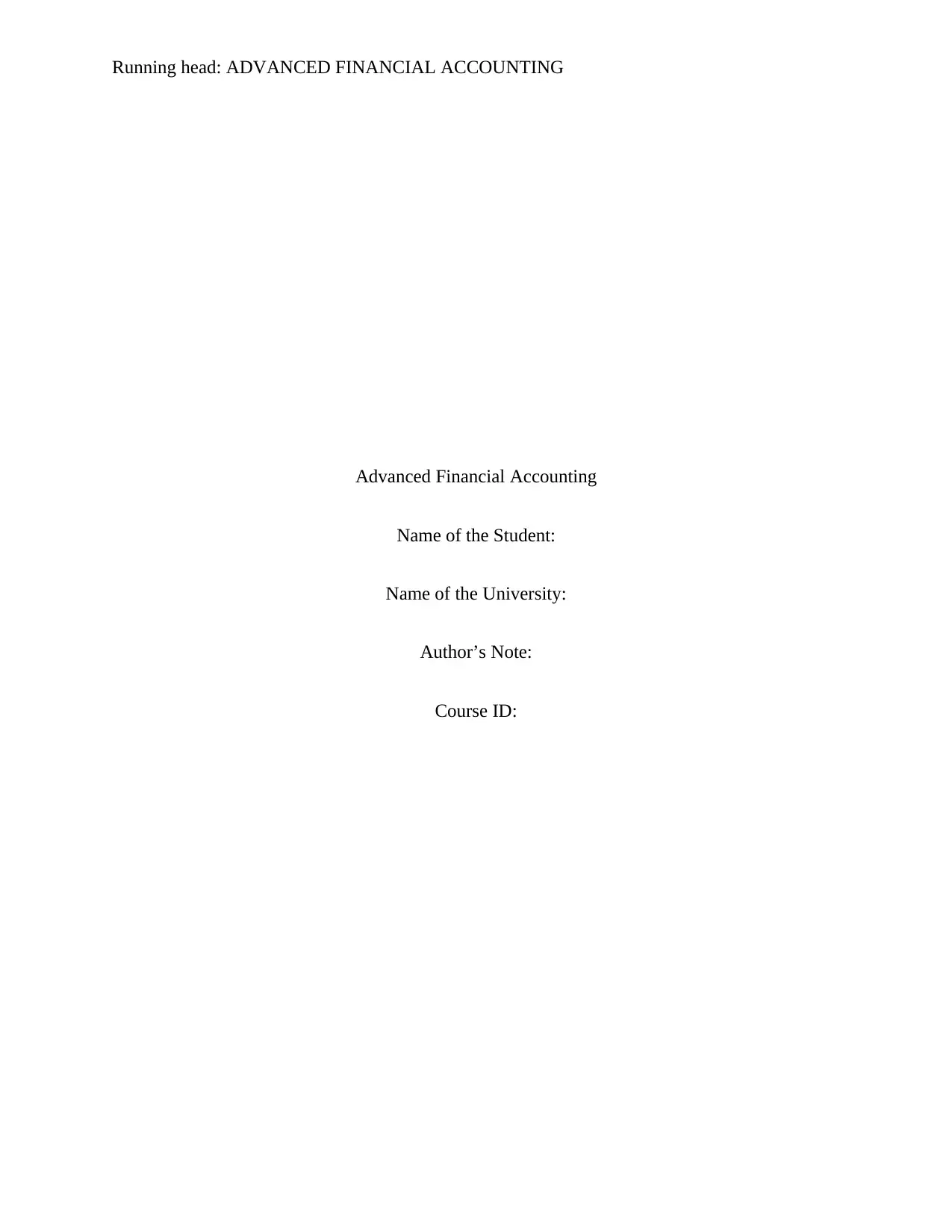
Running head: ADVANCED FINANCIAL ACCOUNTING
Advanced Financial Accounting
Name of the Student:
Name of the University:
Author’s Note:
Course ID:
Advanced Financial Accounting
Name of the Student:
Name of the University:
Author’s Note:
Course ID:
Paraphrase This Document
Need a fresh take? Get an instant paraphrase of this document with our AI Paraphraser
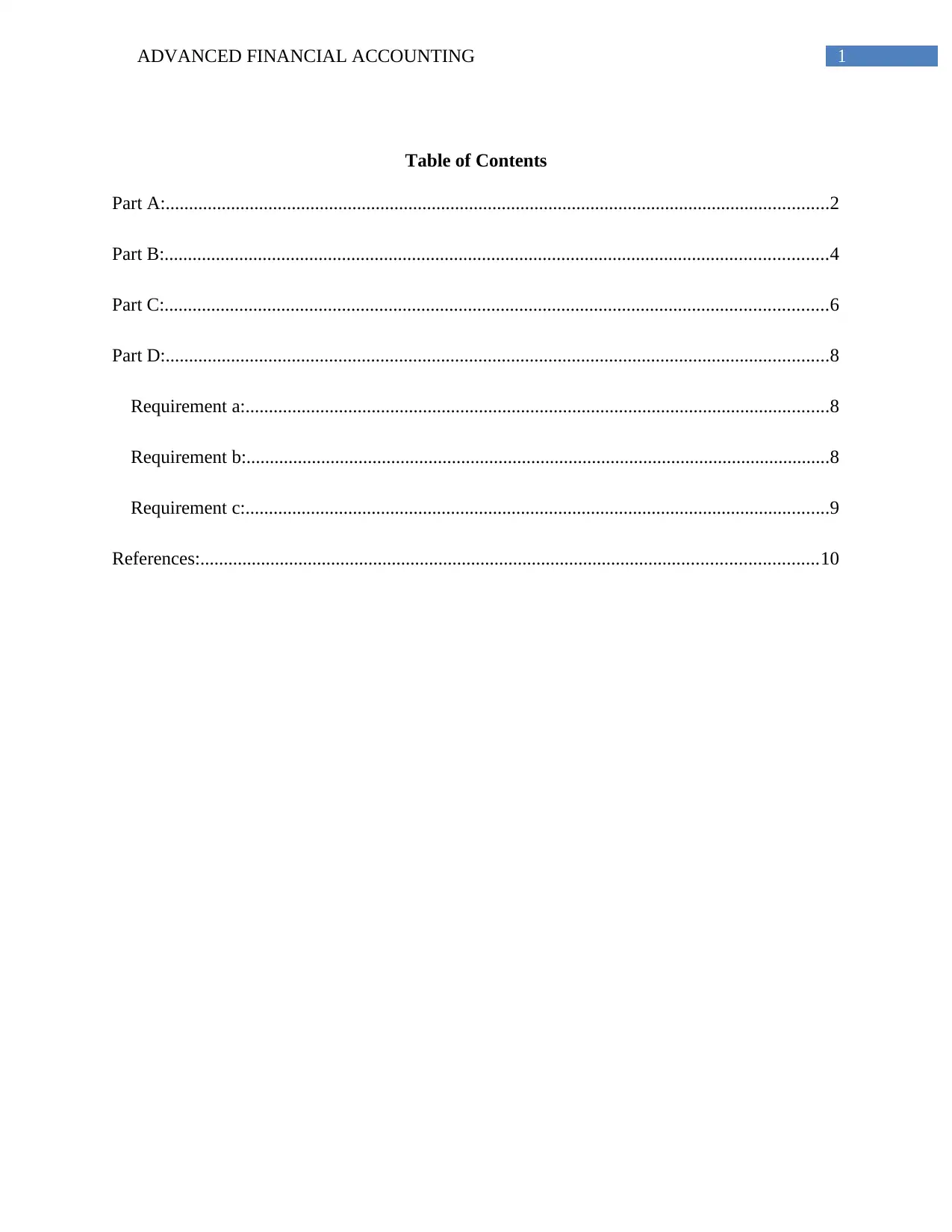
1ADVANCED FINANCIAL ACCOUNTING
Table of Contents
Part A:..............................................................................................................................................2
Part B:..............................................................................................................................................4
Part C:..............................................................................................................................................6
Part D:..............................................................................................................................................8
Requirement a:.............................................................................................................................8
Requirement b:.............................................................................................................................8
Requirement c:.............................................................................................................................9
References:....................................................................................................................................10
Table of Contents
Part A:..............................................................................................................................................2
Part B:..............................................................................................................................................4
Part C:..............................................................................................................................................6
Part D:..............................................................................................................................................8
Requirement a:.............................................................................................................................8
Requirement b:.............................................................................................................................8
Requirement c:.............................................................................................................................9
References:....................................................................................................................................10
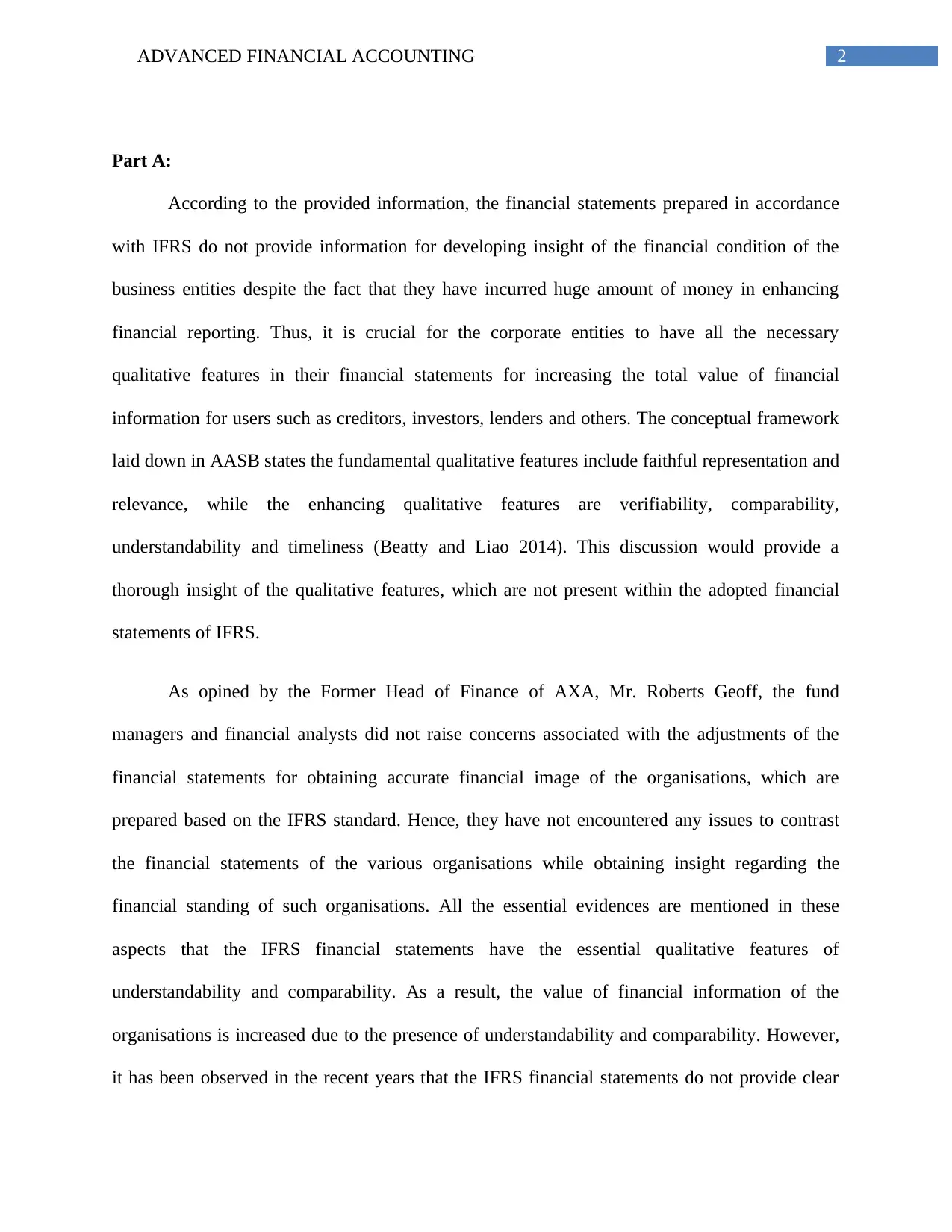
2ADVANCED FINANCIAL ACCOUNTING
Part A:
According to the provided information, the financial statements prepared in accordance
with IFRS do not provide information for developing insight of the financial condition of the
business entities despite the fact that they have incurred huge amount of money in enhancing
financial reporting. Thus, it is crucial for the corporate entities to have all the necessary
qualitative features in their financial statements for increasing the total value of financial
information for users such as creditors, investors, lenders and others. The conceptual framework
laid down in AASB states the fundamental qualitative features include faithful representation and
relevance, while the enhancing qualitative features are verifiability, comparability,
understandability and timeliness (Beatty and Liao 2014). This discussion would provide a
thorough insight of the qualitative features, which are not present within the adopted financial
statements of IFRS.
As opined by the Former Head of Finance of AXA, Mr. Roberts Geoff, the fund
managers and financial analysts did not raise concerns associated with the adjustments of the
financial statements for obtaining accurate financial image of the organisations, which are
prepared based on the IFRS standard. Hence, they have not encountered any issues to contrast
the financial statements of the various organisations while obtaining insight regarding the
financial standing of such organisations. All the essential evidences are mentioned in these
aspects that the IFRS financial statements have the essential qualitative features of
understandability and comparability. As a result, the value of financial information of the
organisations is increased due to the presence of understandability and comparability. However,
it has been observed in the recent years that the IFRS financial statements do not provide clear
Part A:
According to the provided information, the financial statements prepared in accordance
with IFRS do not provide information for developing insight of the financial condition of the
business entities despite the fact that they have incurred huge amount of money in enhancing
financial reporting. Thus, it is crucial for the corporate entities to have all the necessary
qualitative features in their financial statements for increasing the total value of financial
information for users such as creditors, investors, lenders and others. The conceptual framework
laid down in AASB states the fundamental qualitative features include faithful representation and
relevance, while the enhancing qualitative features are verifiability, comparability,
understandability and timeliness (Beatty and Liao 2014). This discussion would provide a
thorough insight of the qualitative features, which are not present within the adopted financial
statements of IFRS.
As opined by the Former Head of Finance of AXA, Mr. Roberts Geoff, the fund
managers and financial analysts did not raise concerns associated with the adjustments of the
financial statements for obtaining accurate financial image of the organisations, which are
prepared based on the IFRS standard. Hence, they have not encountered any issues to contrast
the financial statements of the various organisations while obtaining insight regarding the
financial standing of such organisations. All the essential evidences are mentioned in these
aspects that the IFRS financial statements have the essential qualitative features of
understandability and comparability. As a result, the value of financial information of the
organisations is increased due to the presence of understandability and comparability. However,
it has been observed in the recent years that the IFRS financial statements do not provide clear
⊘ This is a preview!⊘
Do you want full access?
Subscribe today to unlock all pages.

Trusted by 1+ million students worldwide
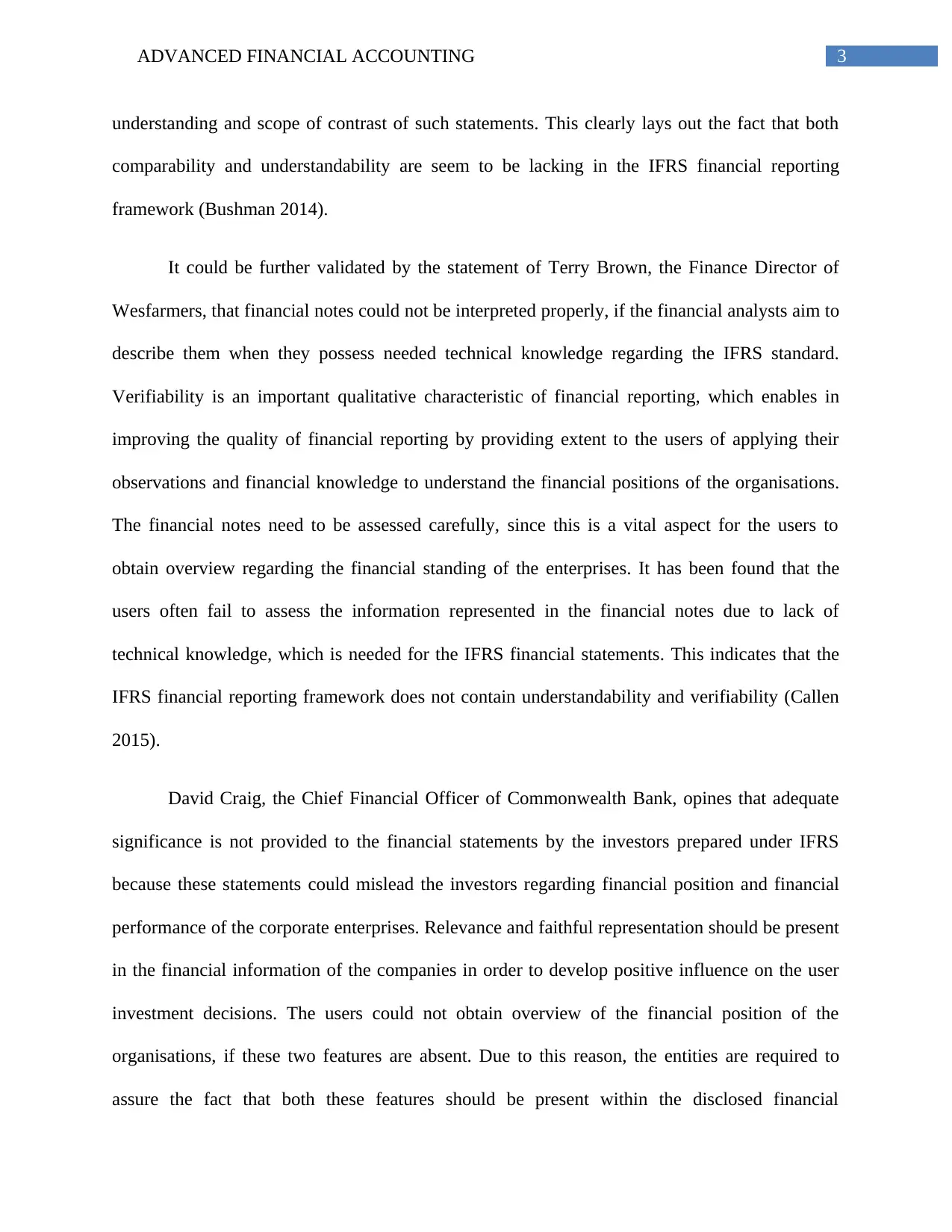
3ADVANCED FINANCIAL ACCOUNTING
understanding and scope of contrast of such statements. This clearly lays out the fact that both
comparability and understandability are seem to be lacking in the IFRS financial reporting
framework (Bushman 2014).
It could be further validated by the statement of Terry Brown, the Finance Director of
Wesfarmers, that financial notes could not be interpreted properly, if the financial analysts aim to
describe them when they possess needed technical knowledge regarding the IFRS standard.
Verifiability is an important qualitative characteristic of financial reporting, which enables in
improving the quality of financial reporting by providing extent to the users of applying their
observations and financial knowledge to understand the financial positions of the organisations.
The financial notes need to be assessed carefully, since this is a vital aspect for the users to
obtain overview regarding the financial standing of the enterprises. It has been found that the
users often fail to assess the information represented in the financial notes due to lack of
technical knowledge, which is needed for the IFRS financial statements. This indicates that the
IFRS financial reporting framework does not contain understandability and verifiability (Callen
2015).
David Craig, the Chief Financial Officer of Commonwealth Bank, opines that adequate
significance is not provided to the financial statements by the investors prepared under IFRS
because these statements could mislead the investors regarding financial position and financial
performance of the corporate enterprises. Relevance and faithful representation should be present
in the financial information of the companies in order to develop positive influence on the user
investment decisions. The users could not obtain overview of the financial position of the
organisations, if these two features are absent. Due to this reason, the entities are required to
assure the fact that both these features should be present within the disclosed financial
understanding and scope of contrast of such statements. This clearly lays out the fact that both
comparability and understandability are seem to be lacking in the IFRS financial reporting
framework (Bushman 2014).
It could be further validated by the statement of Terry Brown, the Finance Director of
Wesfarmers, that financial notes could not be interpreted properly, if the financial analysts aim to
describe them when they possess needed technical knowledge regarding the IFRS standard.
Verifiability is an important qualitative characteristic of financial reporting, which enables in
improving the quality of financial reporting by providing extent to the users of applying their
observations and financial knowledge to understand the financial positions of the organisations.
The financial notes need to be assessed carefully, since this is a vital aspect for the users to
obtain overview regarding the financial standing of the enterprises. It has been found that the
users often fail to assess the information represented in the financial notes due to lack of
technical knowledge, which is needed for the IFRS financial statements. This indicates that the
IFRS financial reporting framework does not contain understandability and verifiability (Callen
2015).
David Craig, the Chief Financial Officer of Commonwealth Bank, opines that adequate
significance is not provided to the financial statements by the investors prepared under IFRS
because these statements could mislead the investors regarding financial position and financial
performance of the corporate enterprises. Relevance and faithful representation should be present
in the financial information of the companies in order to develop positive influence on the user
investment decisions. The users could not obtain overview of the financial position of the
organisations, if these two features are absent. Due to this reason, the entities are required to
assure the fact that both these features should be present within the disclosed financial
Paraphrase This Document
Need a fresh take? Get an instant paraphrase of this document with our AI Paraphraser
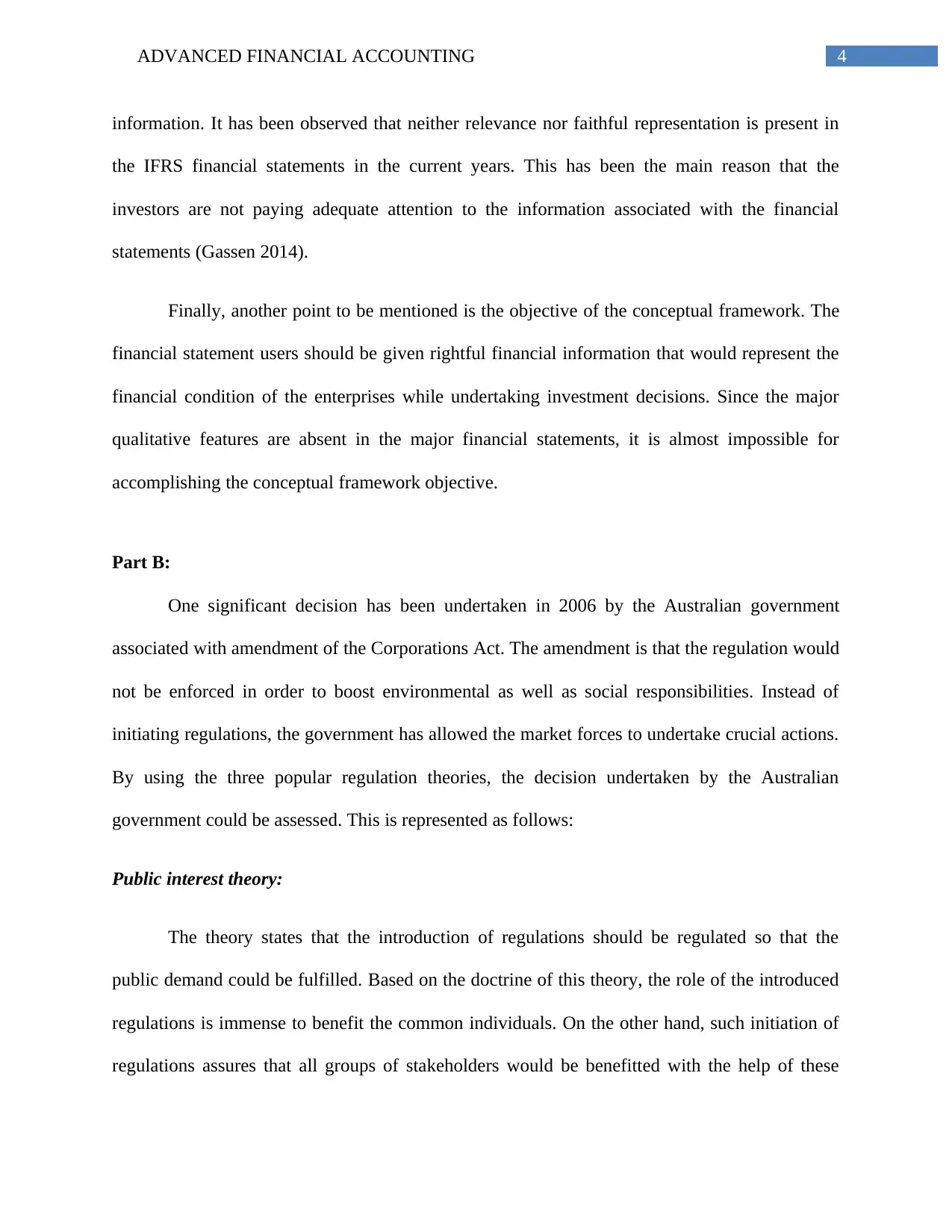
4ADVANCED FINANCIAL ACCOUNTING
information. It has been observed that neither relevance nor faithful representation is present in
the IFRS financial statements in the current years. This has been the main reason that the
investors are not paying adequate attention to the information associated with the financial
statements (Gassen 2014).
Finally, another point to be mentioned is the objective of the conceptual framework. The
financial statement users should be given rightful financial information that would represent the
financial condition of the enterprises while undertaking investment decisions. Since the major
qualitative features are absent in the major financial statements, it is almost impossible for
accomplishing the conceptual framework objective.
Part B:
One significant decision has been undertaken in 2006 by the Australian government
associated with amendment of the Corporations Act. The amendment is that the regulation would
not be enforced in order to boost environmental as well as social responsibilities. Instead of
initiating regulations, the government has allowed the market forces to undertake crucial actions.
By using the three popular regulation theories, the decision undertaken by the Australian
government could be assessed. This is represented as follows:
Public interest theory:
The theory states that the introduction of regulations should be regulated so that the
public demand could be fulfilled. Based on the doctrine of this theory, the role of the introduced
regulations is immense to benefit the common individuals. On the other hand, such initiation of
regulations assures that all groups of stakeholders would be benefitted with the help of these
information. It has been observed that neither relevance nor faithful representation is present in
the IFRS financial statements in the current years. This has been the main reason that the
investors are not paying adequate attention to the information associated with the financial
statements (Gassen 2014).
Finally, another point to be mentioned is the objective of the conceptual framework. The
financial statement users should be given rightful financial information that would represent the
financial condition of the enterprises while undertaking investment decisions. Since the major
qualitative features are absent in the major financial statements, it is almost impossible for
accomplishing the conceptual framework objective.
Part B:
One significant decision has been undertaken in 2006 by the Australian government
associated with amendment of the Corporations Act. The amendment is that the regulation would
not be enforced in order to boost environmental as well as social responsibilities. Instead of
initiating regulations, the government has allowed the market forces to undertake crucial actions.
By using the three popular regulation theories, the decision undertaken by the Australian
government could be assessed. This is represented as follows:
Public interest theory:
The theory states that the introduction of regulations should be regulated so that the
public demand could be fulfilled. Based on the doctrine of this theory, the role of the introduced
regulations is immense to benefit the common individuals. On the other hand, such initiation of
regulations assures that all groups of stakeholders would be benefitted with the help of these
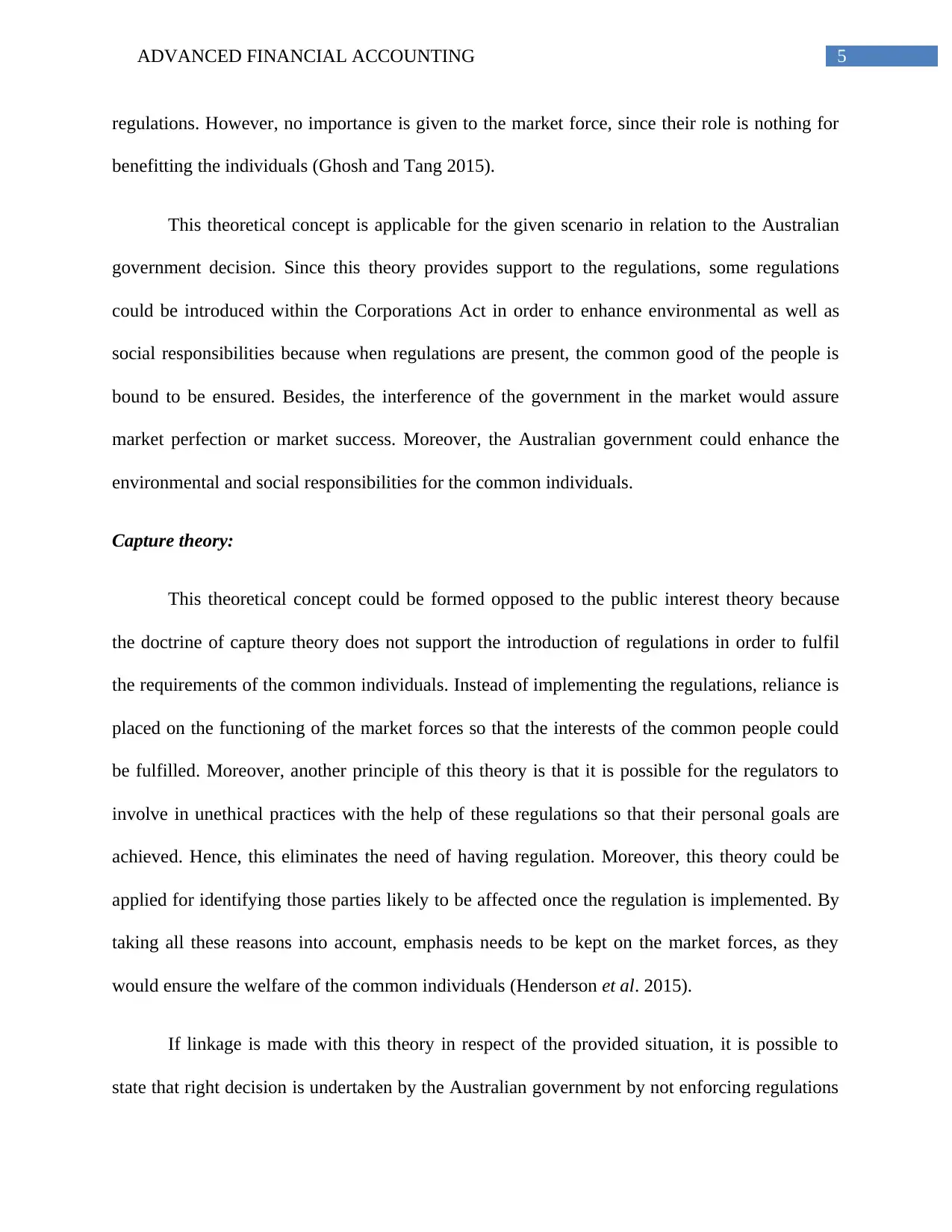
5ADVANCED FINANCIAL ACCOUNTING
regulations. However, no importance is given to the market force, since their role is nothing for
benefitting the individuals (Ghosh and Tang 2015).
This theoretical concept is applicable for the given scenario in relation to the Australian
government decision. Since this theory provides support to the regulations, some regulations
could be introduced within the Corporations Act in order to enhance environmental as well as
social responsibilities because when regulations are present, the common good of the people is
bound to be ensured. Besides, the interference of the government in the market would assure
market perfection or market success. Moreover, the Australian government could enhance the
environmental and social responsibilities for the common individuals.
Capture theory:
This theoretical concept could be formed opposed to the public interest theory because
the doctrine of capture theory does not support the introduction of regulations in order to fulfil
the requirements of the common individuals. Instead of implementing the regulations, reliance is
placed on the functioning of the market forces so that the interests of the common people could
be fulfilled. Moreover, another principle of this theory is that it is possible for the regulators to
involve in unethical practices with the help of these regulations so that their personal goals are
achieved. Hence, this eliminates the need of having regulation. Moreover, this theory could be
applied for identifying those parties likely to be affected once the regulation is implemented. By
taking all these reasons into account, emphasis needs to be kept on the market forces, as they
would ensure the welfare of the common individuals (Henderson et al. 2015).
If linkage is made with this theory in respect of the provided situation, it is possible to
state that right decision is undertaken by the Australian government by not enforcing regulations
regulations. However, no importance is given to the market force, since their role is nothing for
benefitting the individuals (Ghosh and Tang 2015).
This theoretical concept is applicable for the given scenario in relation to the Australian
government decision. Since this theory provides support to the regulations, some regulations
could be introduced within the Corporations Act in order to enhance environmental as well as
social responsibilities because when regulations are present, the common good of the people is
bound to be ensured. Besides, the interference of the government in the market would assure
market perfection or market success. Moreover, the Australian government could enhance the
environmental and social responsibilities for the common individuals.
Capture theory:
This theoretical concept could be formed opposed to the public interest theory because
the doctrine of capture theory does not support the introduction of regulations in order to fulfil
the requirements of the common individuals. Instead of implementing the regulations, reliance is
placed on the functioning of the market forces so that the interests of the common people could
be fulfilled. Moreover, another principle of this theory is that it is possible for the regulators to
involve in unethical practices with the help of these regulations so that their personal goals are
achieved. Hence, this eliminates the need of having regulation. Moreover, this theory could be
applied for identifying those parties likely to be affected once the regulation is implemented. By
taking all these reasons into account, emphasis needs to be kept on the market forces, as they
would ensure the welfare of the common individuals (Henderson et al. 2015).
If linkage is made with this theory in respect of the provided situation, it is possible to
state that right decision is undertaken by the Australian government by not enforcing regulations
⊘ This is a preview!⊘
Do you want full access?
Subscribe today to unlock all pages.

Trusted by 1+ million students worldwide
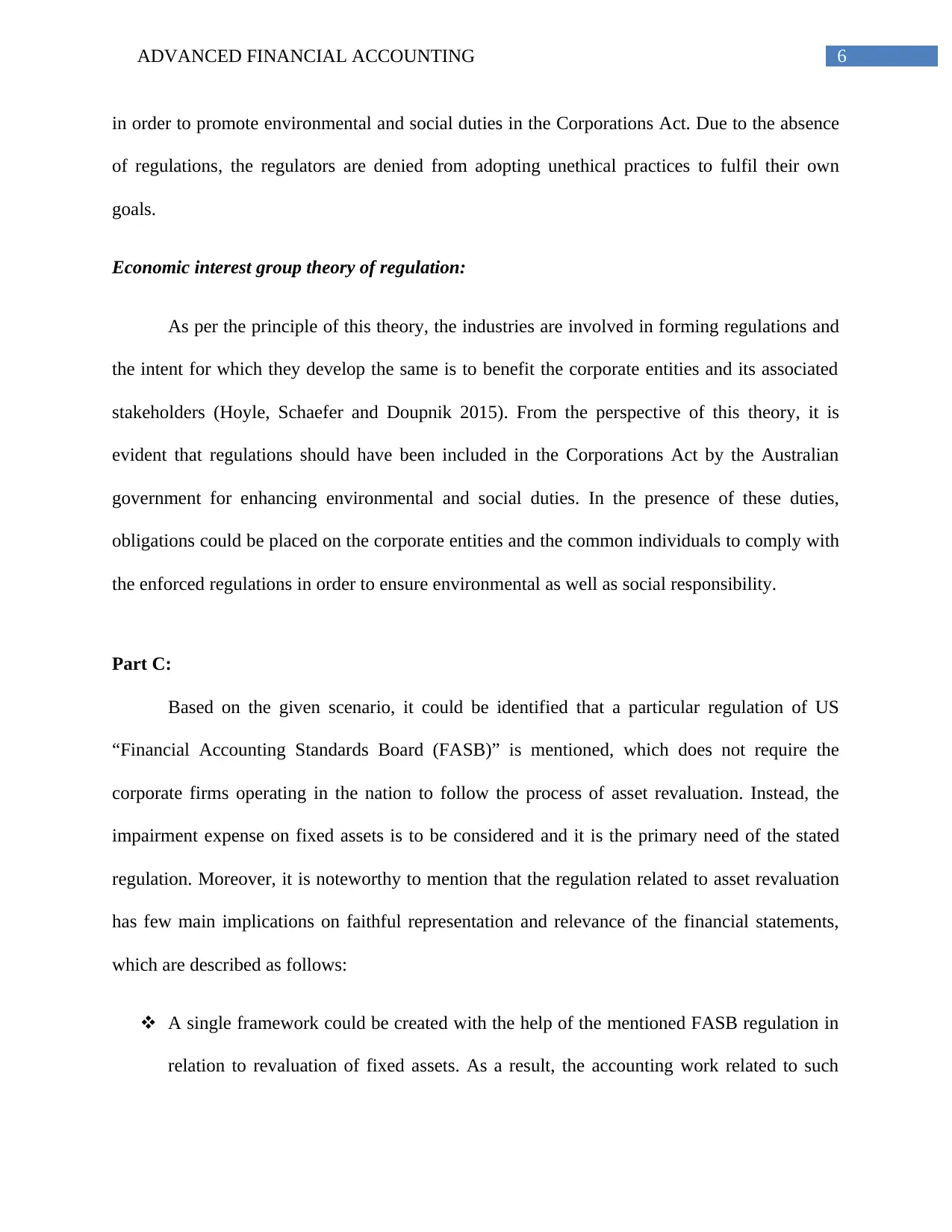
6ADVANCED FINANCIAL ACCOUNTING
in order to promote environmental and social duties in the Corporations Act. Due to the absence
of regulations, the regulators are denied from adopting unethical practices to fulfil their own
goals.
Economic interest group theory of regulation:
As per the principle of this theory, the industries are involved in forming regulations and
the intent for which they develop the same is to benefit the corporate entities and its associated
stakeholders (Hoyle, Schaefer and Doupnik 2015). From the perspective of this theory, it is
evident that regulations should have been included in the Corporations Act by the Australian
government for enhancing environmental and social duties. In the presence of these duties,
obligations could be placed on the corporate entities and the common individuals to comply with
the enforced regulations in order to ensure environmental as well as social responsibility.
Part C:
Based on the given scenario, it could be identified that a particular regulation of US
“Financial Accounting Standards Board (FASB)” is mentioned, which does not require the
corporate firms operating in the nation to follow the process of asset revaluation. Instead, the
impairment expense on fixed assets is to be considered and it is the primary need of the stated
regulation. Moreover, it is noteworthy to mention that the regulation related to asset revaluation
has few main implications on faithful representation and relevance of the financial statements,
which are described as follows:
A single framework could be created with the help of the mentioned FASB regulation in
relation to revaluation of fixed assets. As a result, the accounting work related to such
in order to promote environmental and social duties in the Corporations Act. Due to the absence
of regulations, the regulators are denied from adopting unethical practices to fulfil their own
goals.
Economic interest group theory of regulation:
As per the principle of this theory, the industries are involved in forming regulations and
the intent for which they develop the same is to benefit the corporate entities and its associated
stakeholders (Hoyle, Schaefer and Doupnik 2015). From the perspective of this theory, it is
evident that regulations should have been included in the Corporations Act by the Australian
government for enhancing environmental and social duties. In the presence of these duties,
obligations could be placed on the corporate entities and the common individuals to comply with
the enforced regulations in order to ensure environmental as well as social responsibility.
Part C:
Based on the given scenario, it could be identified that a particular regulation of US
“Financial Accounting Standards Board (FASB)” is mentioned, which does not require the
corporate firms operating in the nation to follow the process of asset revaluation. Instead, the
impairment expense on fixed assets is to be considered and it is the primary need of the stated
regulation. Moreover, it is noteworthy to mention that the regulation related to asset revaluation
has few main implications on faithful representation and relevance of the financial statements,
which are described as follows:
A single framework could be created with the help of the mentioned FASB regulation in
relation to revaluation of fixed assets. As a result, the accounting work related to such
Paraphrase This Document
Need a fresh take? Get an instant paraphrase of this document with our AI Paraphraser
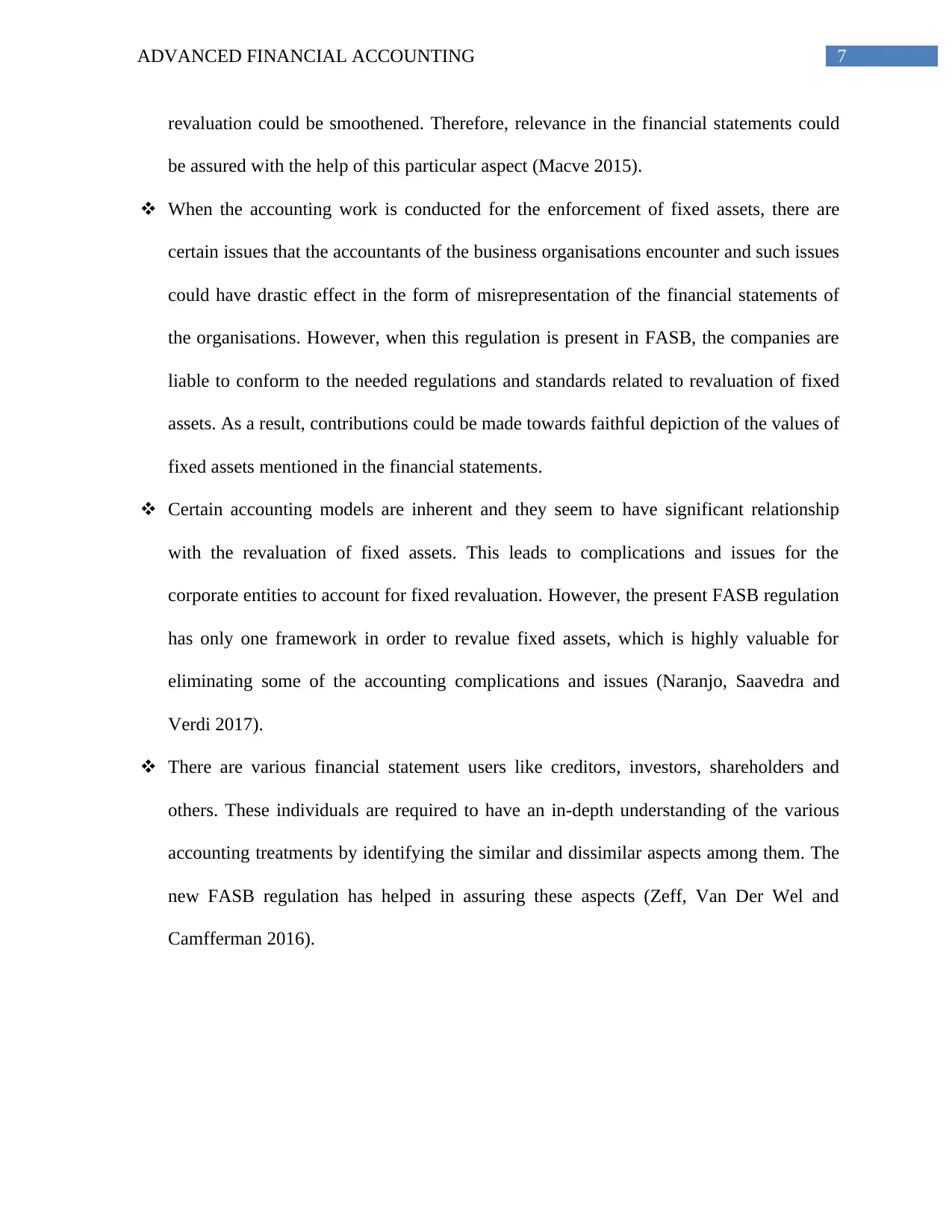
7ADVANCED FINANCIAL ACCOUNTING
revaluation could be smoothened. Therefore, relevance in the financial statements could
be assured with the help of this particular aspect (Macve 2015).
When the accounting work is conducted for the enforcement of fixed assets, there are
certain issues that the accountants of the business organisations encounter and such issues
could have drastic effect in the form of misrepresentation of the financial statements of
the organisations. However, when this regulation is present in FASB, the companies are
liable to conform to the needed regulations and standards related to revaluation of fixed
assets. As a result, contributions could be made towards faithful depiction of the values of
fixed assets mentioned in the financial statements.
Certain accounting models are inherent and they seem to have significant relationship
with the revaluation of fixed assets. This leads to complications and issues for the
corporate entities to account for fixed revaluation. However, the present FASB regulation
has only one framework in order to revalue fixed assets, which is highly valuable for
eliminating some of the accounting complications and issues (Naranjo, Saavedra and
Verdi 2017).
There are various financial statement users like creditors, investors, shareholders and
others. These individuals are required to have an in-depth understanding of the various
accounting treatments by identifying the similar and dissimilar aspects among them. The
new FASB regulation has helped in assuring these aspects (Zeff, Van Der Wel and
Camfferman 2016).
revaluation could be smoothened. Therefore, relevance in the financial statements could
be assured with the help of this particular aspect (Macve 2015).
When the accounting work is conducted for the enforcement of fixed assets, there are
certain issues that the accountants of the business organisations encounter and such issues
could have drastic effect in the form of misrepresentation of the financial statements of
the organisations. However, when this regulation is present in FASB, the companies are
liable to conform to the needed regulations and standards related to revaluation of fixed
assets. As a result, contributions could be made towards faithful depiction of the values of
fixed assets mentioned in the financial statements.
Certain accounting models are inherent and they seem to have significant relationship
with the revaluation of fixed assets. This leads to complications and issues for the
corporate entities to account for fixed revaluation. However, the present FASB regulation
has only one framework in order to revalue fixed assets, which is highly valuable for
eliminating some of the accounting complications and issues (Naranjo, Saavedra and
Verdi 2017).
There are various financial statement users like creditors, investors, shareholders and
others. These individuals are required to have an in-depth understanding of the various
accounting treatments by identifying the similar and dissimilar aspects among them. The
new FASB regulation has helped in assuring these aspects (Zeff, Van Der Wel and
Camfferman 2016).
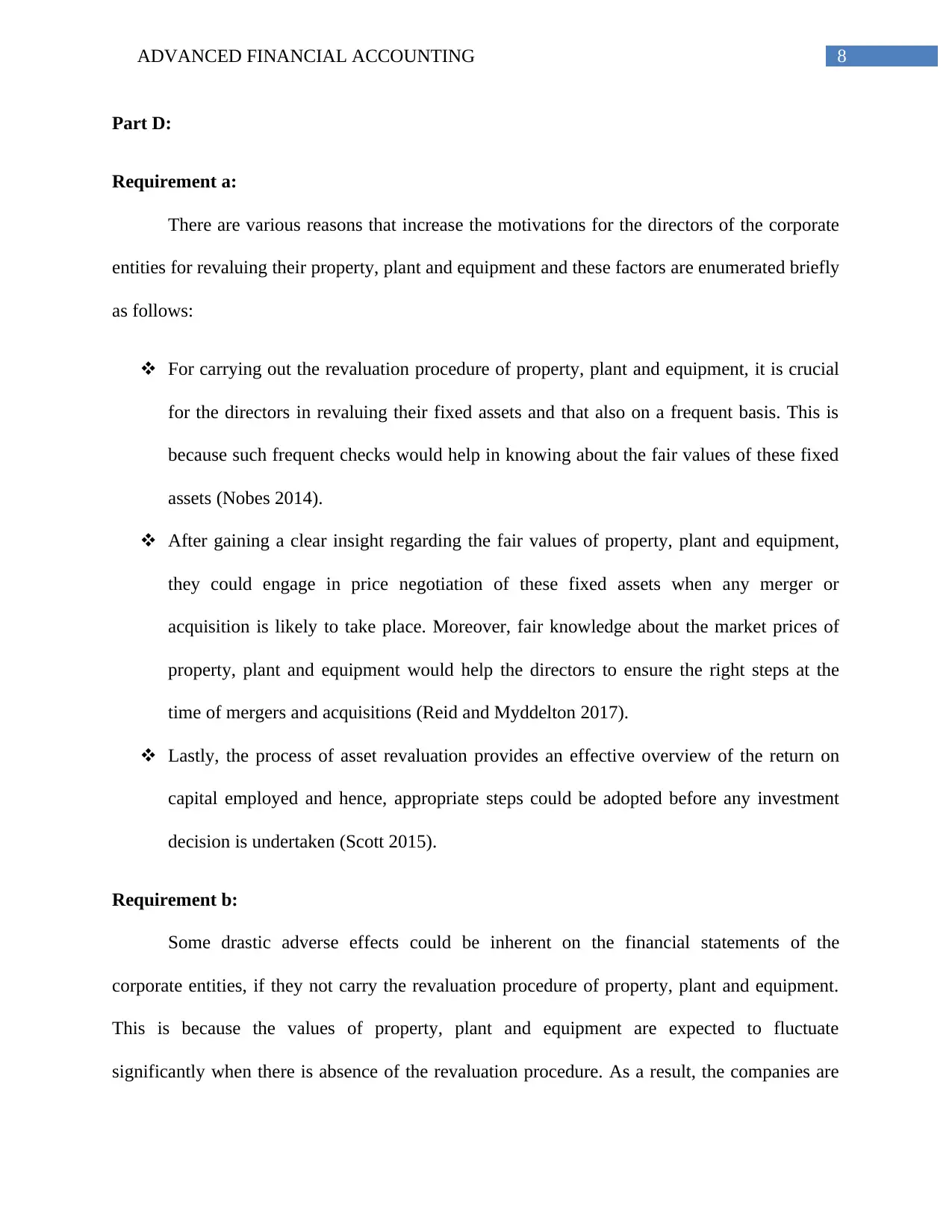
8ADVANCED FINANCIAL ACCOUNTING
Part D:
Requirement a:
There are various reasons that increase the motivations for the directors of the corporate
entities for revaluing their property, plant and equipment and these factors are enumerated briefly
as follows:
For carrying out the revaluation procedure of property, plant and equipment, it is crucial
for the directors in revaluing their fixed assets and that also on a frequent basis. This is
because such frequent checks would help in knowing about the fair values of these fixed
assets (Nobes 2014).
After gaining a clear insight regarding the fair values of property, plant and equipment,
they could engage in price negotiation of these fixed assets when any merger or
acquisition is likely to take place. Moreover, fair knowledge about the market prices of
property, plant and equipment would help the directors to ensure the right steps at the
time of mergers and acquisitions (Reid and Myddelton 2017).
Lastly, the process of asset revaluation provides an effective overview of the return on
capital employed and hence, appropriate steps could be adopted before any investment
decision is undertaken (Scott 2015).
Requirement b:
Some drastic adverse effects could be inherent on the financial statements of the
corporate entities, if they not carry the revaluation procedure of property, plant and equipment.
This is because the values of property, plant and equipment are expected to fluctuate
significantly when there is absence of the revaluation procedure. As a result, the companies are
Part D:
Requirement a:
There are various reasons that increase the motivations for the directors of the corporate
entities for revaluing their property, plant and equipment and these factors are enumerated briefly
as follows:
For carrying out the revaluation procedure of property, plant and equipment, it is crucial
for the directors in revaluing their fixed assets and that also on a frequent basis. This is
because such frequent checks would help in knowing about the fair values of these fixed
assets (Nobes 2014).
After gaining a clear insight regarding the fair values of property, plant and equipment,
they could engage in price negotiation of these fixed assets when any merger or
acquisition is likely to take place. Moreover, fair knowledge about the market prices of
property, plant and equipment would help the directors to ensure the right steps at the
time of mergers and acquisitions (Reid and Myddelton 2017).
Lastly, the process of asset revaluation provides an effective overview of the return on
capital employed and hence, appropriate steps could be adopted before any investment
decision is undertaken (Scott 2015).
Requirement b:
Some drastic adverse effects could be inherent on the financial statements of the
corporate entities, if they not carry the revaluation procedure of property, plant and equipment.
This is because the values of property, plant and equipment are expected to fluctuate
significantly when there is absence of the revaluation procedure. As a result, the companies are
⊘ This is a preview!⊘
Do you want full access?
Subscribe today to unlock all pages.

Trusted by 1+ million students worldwide
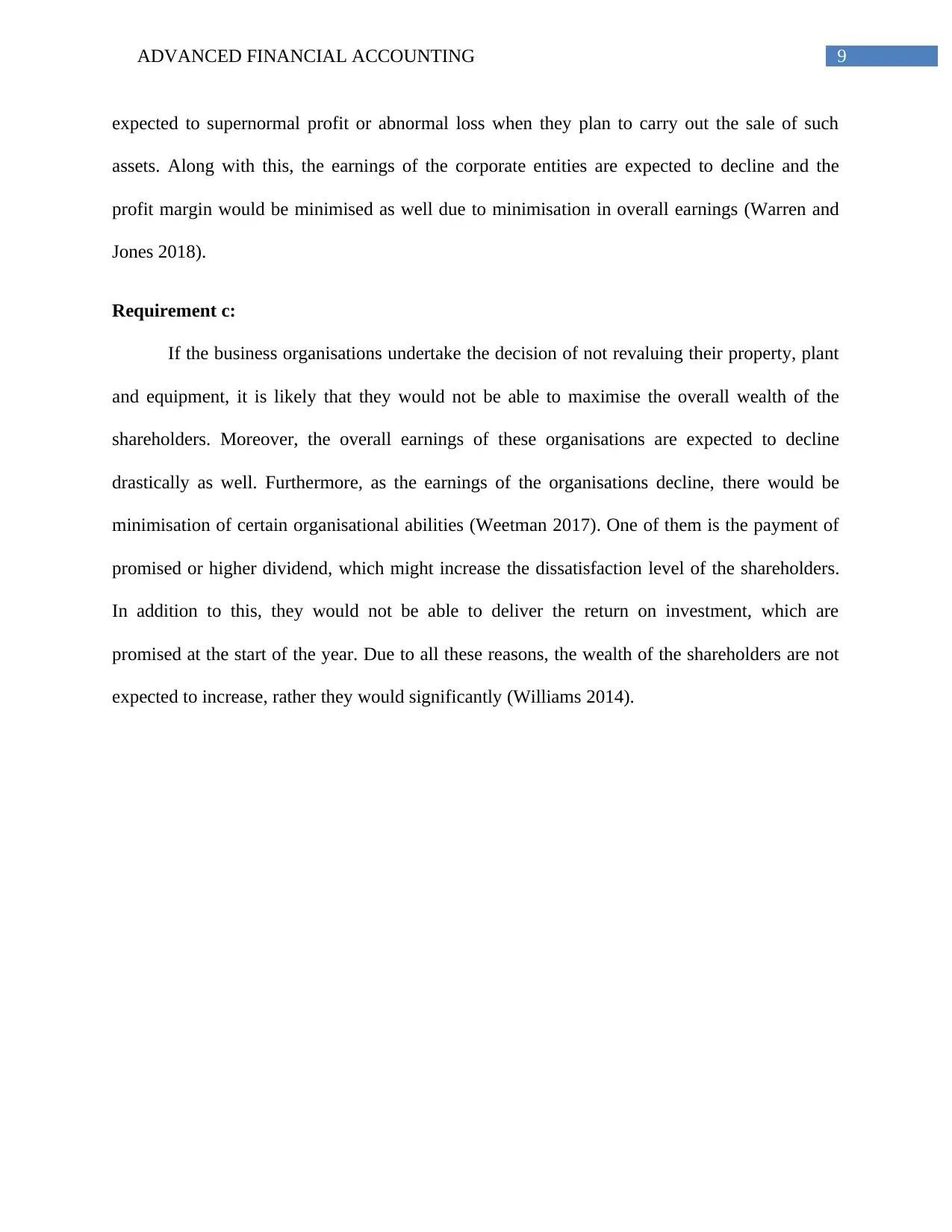
9ADVANCED FINANCIAL ACCOUNTING
expected to supernormal profit or abnormal loss when they plan to carry out the sale of such
assets. Along with this, the earnings of the corporate entities are expected to decline and the
profit margin would be minimised as well due to minimisation in overall earnings (Warren and
Jones 2018).
Requirement c:
If the business organisations undertake the decision of not revaluing their property, plant
and equipment, it is likely that they would not be able to maximise the overall wealth of the
shareholders. Moreover, the overall earnings of these organisations are expected to decline
drastically as well. Furthermore, as the earnings of the organisations decline, there would be
minimisation of certain organisational abilities (Weetman 2017). One of them is the payment of
promised or higher dividend, which might increase the dissatisfaction level of the shareholders.
In addition to this, they would not be able to deliver the return on investment, which are
promised at the start of the year. Due to all these reasons, the wealth of the shareholders are not
expected to increase, rather they would significantly (Williams 2014).
expected to supernormal profit or abnormal loss when they plan to carry out the sale of such
assets. Along with this, the earnings of the corporate entities are expected to decline and the
profit margin would be minimised as well due to minimisation in overall earnings (Warren and
Jones 2018).
Requirement c:
If the business organisations undertake the decision of not revaluing their property, plant
and equipment, it is likely that they would not be able to maximise the overall wealth of the
shareholders. Moreover, the overall earnings of these organisations are expected to decline
drastically as well. Furthermore, as the earnings of the organisations decline, there would be
minimisation of certain organisational abilities (Weetman 2017). One of them is the payment of
promised or higher dividend, which might increase the dissatisfaction level of the shareholders.
In addition to this, they would not be able to deliver the return on investment, which are
promised at the start of the year. Due to all these reasons, the wealth of the shareholders are not
expected to increase, rather they would significantly (Williams 2014).
Paraphrase This Document
Need a fresh take? Get an instant paraphrase of this document with our AI Paraphraser
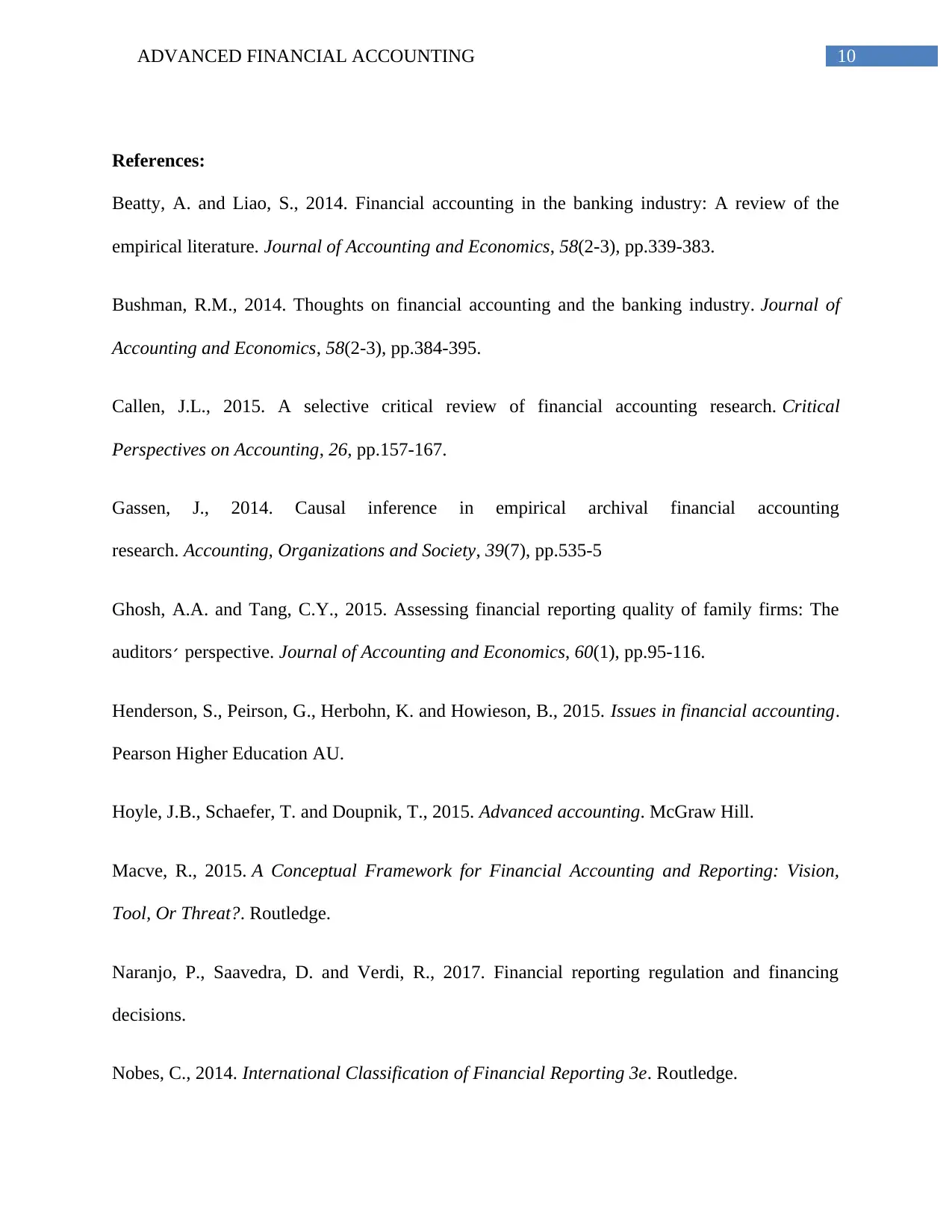
10ADVANCED FINANCIAL ACCOUNTING
References:
Beatty, A. and Liao, S., 2014. Financial accounting in the banking industry: A review of the
empirical literature. Journal of Accounting and Economics, 58(2-3), pp.339-383.
Bushman, R.M., 2014. Thoughts on financial accounting and the banking industry. Journal of
Accounting and Economics, 58(2-3), pp.384-395.
Callen, J.L., 2015. A selective critical review of financial accounting research. Critical
Perspectives on Accounting, 26, pp.157-167.
Gassen, J., 2014. Causal inference in empirical archival financial accounting
research. Accounting, Organizations and Society, 39(7), pp.535-5
Ghosh, A.A. and Tang, C.Y., 2015. Assessing financial reporting quality of family firms: The
auditors׳ perspective. Journal of Accounting and Economics, 60(1), pp.95-116.
Henderson, S., Peirson, G., Herbohn, K. and Howieson, B., 2015. Issues in financial accounting.
Pearson Higher Education AU.
Hoyle, J.B., Schaefer, T. and Doupnik, T., 2015. Advanced accounting. McGraw Hill.
Macve, R., 2015. A Conceptual Framework for Financial Accounting and Reporting: Vision,
Tool, Or Threat?. Routledge.
Naranjo, P., Saavedra, D. and Verdi, R., 2017. Financial reporting regulation and financing
decisions.
Nobes, C., 2014. International Classification of Financial Reporting 3e. Routledge.
References:
Beatty, A. and Liao, S., 2014. Financial accounting in the banking industry: A review of the
empirical literature. Journal of Accounting and Economics, 58(2-3), pp.339-383.
Bushman, R.M., 2014. Thoughts on financial accounting and the banking industry. Journal of
Accounting and Economics, 58(2-3), pp.384-395.
Callen, J.L., 2015. A selective critical review of financial accounting research. Critical
Perspectives on Accounting, 26, pp.157-167.
Gassen, J., 2014. Causal inference in empirical archival financial accounting
research. Accounting, Organizations and Society, 39(7), pp.535-5
Ghosh, A.A. and Tang, C.Y., 2015. Assessing financial reporting quality of family firms: The
auditors׳ perspective. Journal of Accounting and Economics, 60(1), pp.95-116.
Henderson, S., Peirson, G., Herbohn, K. and Howieson, B., 2015. Issues in financial accounting.
Pearson Higher Education AU.
Hoyle, J.B., Schaefer, T. and Doupnik, T., 2015. Advanced accounting. McGraw Hill.
Macve, R., 2015. A Conceptual Framework for Financial Accounting and Reporting: Vision,
Tool, Or Threat?. Routledge.
Naranjo, P., Saavedra, D. and Verdi, R., 2017. Financial reporting regulation and financing
decisions.
Nobes, C., 2014. International Classification of Financial Reporting 3e. Routledge.
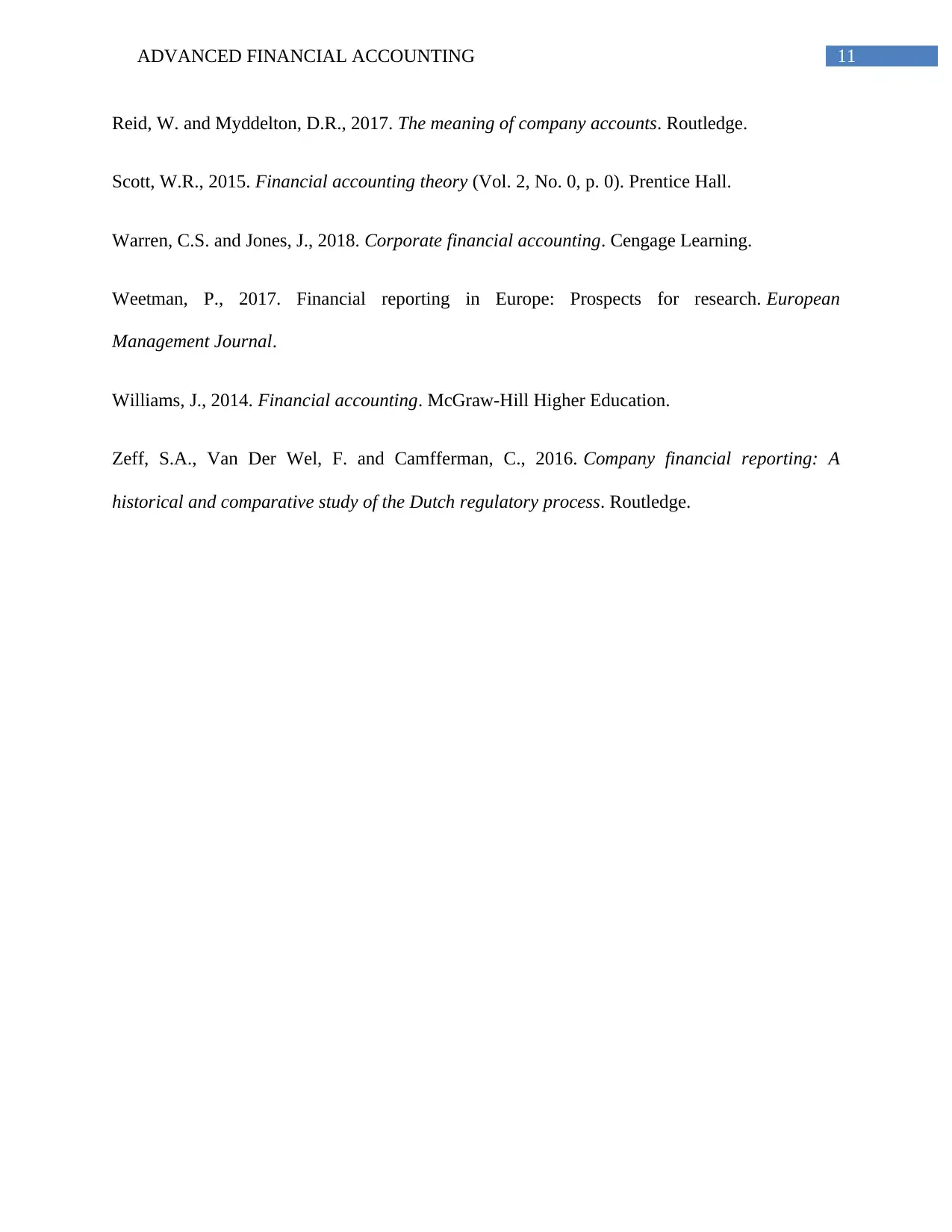
11ADVANCED FINANCIAL ACCOUNTING
Reid, W. and Myddelton, D.R., 2017. The meaning of company accounts. Routledge.
Scott, W.R., 2015. Financial accounting theory (Vol. 2, No. 0, p. 0). Prentice Hall.
Warren, C.S. and Jones, J., 2018. Corporate financial accounting. Cengage Learning.
Weetman, P., 2017. Financial reporting in Europe: Prospects for research. European
Management Journal.
Williams, J., 2014. Financial accounting. McGraw-Hill Higher Education.
Zeff, S.A., Van Der Wel, F. and Camfferman, C., 2016. Company financial reporting: A
historical and comparative study of the Dutch regulatory process. Routledge.
Reid, W. and Myddelton, D.R., 2017. The meaning of company accounts. Routledge.
Scott, W.R., 2015. Financial accounting theory (Vol. 2, No. 0, p. 0). Prentice Hall.
Warren, C.S. and Jones, J., 2018. Corporate financial accounting. Cengage Learning.
Weetman, P., 2017. Financial reporting in Europe: Prospects for research. European
Management Journal.
Williams, J., 2014. Financial accounting. McGraw-Hill Higher Education.
Zeff, S.A., Van Der Wel, F. and Camfferman, C., 2016. Company financial reporting: A
historical and comparative study of the Dutch regulatory process. Routledge.
⊘ This is a preview!⊘
Do you want full access?
Subscribe today to unlock all pages.

Trusted by 1+ million students worldwide
1 out of 12
Related Documents
Your All-in-One AI-Powered Toolkit for Academic Success.
+13062052269
info@desklib.com
Available 24*7 on WhatsApp / Email
![[object Object]](/_next/static/media/star-bottom.7253800d.svg)
Unlock your academic potential
Copyright © 2020–2026 A2Z Services. All Rights Reserved. Developed and managed by ZUCOL.




